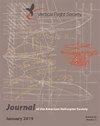三个转子轮毂流量预测研讨会(2016-2020):我们学到了什么,下一步该怎么办?
IF 1.4
4区 工程技术
Q2 ENGINEERING, AEROSPACE
引用次数: 0
摘要
“旋翼毂流量预测研讨会”是实验和计算工作在旋翼毂高雷诺数模型测试和与当前和未来旋翼机相关的长尾流中相关的复杂相互作用空气动力学这一重要领域的富有成效的合作。因此,枢纽流量研讨会已经加入了过去成功合作的行列,如UH-60 Airloads和HART-II研讨会。本文首先介绍了转子轮毂流的基本物理特性,并简要总结了最近的风洞试验活动。接下来,总结了中心流研讨会的发展,重点是实验者和计算参与者之间的富有成效的互动。介绍了迄今为止所有三个研讨会的计算盲比较结果与测量数据的汇编。讨论了实验和计算中与不确定性相关的挑战及其对定量比较的影响。特别是,强调了双方的“经验教训”,并对转子轮毂流领域的剩余挑战和下一步研究步骤进行了展望。本文章由计算机程序翻译,如有差异,请以英文原文为准。
Three Rotor Hub Flow Prediction Workshops (2016–2020): What Did We Learn and What's Next?
The ‘Rotor Hub Flow Prediction Workshops’ have been productive collaborations between experimental and computational efforts in the important area of high-Reynolds number model testing of rotor hubs and associated complex interactional aerodynamics in the long-age wake as relevant to current and future rotorcraft. As such the hub flow workshops have joined the ranks of past successful collaborations such as the UH-60 Airloads and HART-II workshops. This paper begins by describing the basic physics of rotor hub flows and gives a brief summary of recent water-tunnel test campaigns. Following, the evolution of the hub flow workshops is summarized, with emphasis on the productive interactions between experimentalists and computational participants. A compilation of computational blind comparison results against measured data for all three workshops thus far is presented. Challenges associated with uncertainties in both experiments and computations and their effect on quantitative comparisons are discussed. In particular, emphasis is given to the “lessons learned” on both sides and an outlook on remaining challenges and next research steps in the area of rotor hub flows is provided.
求助全文
通过发布文献求助,成功后即可免费获取论文全文。
去求助
来源期刊

Journal of the American Helicopter Society
工程技术-工程:宇航
CiteScore
4.10
自引率
33.30%
发文量
36
审稿时长
>12 weeks
期刊介绍:
The Journal of the American Helicopter Society is a peer-reviewed technical journal published quarterly (January, April, July and October) by AHS — The Vertical Flight Society. It is the world''s only scientific journal dedicated to vertical flight technology and is available in print and online.
The Journal publishes original technical papers dealing with theory and practice of vertical flight. The Journal seeks to foster the exchange of significant new ideas and information about helicopters and V/STOL aircraft. The scope of the Journal covers the full range of research, analysis, design, manufacturing, test, operations, and support. A constantly growing list of specialty areas is included within that scope. These range from the classical specialties like aerodynamic, dynamics and structures to more recent priorities such as acoustics, materials and signature reduction and to operational issues such as design criteria, safety and reliability. (Note: semi- and nontechnical articles of more general interest reporting current events or experiences should be sent to the VFS magazine
 求助内容:
求助内容: 应助结果提醒方式:
应助结果提醒方式:


